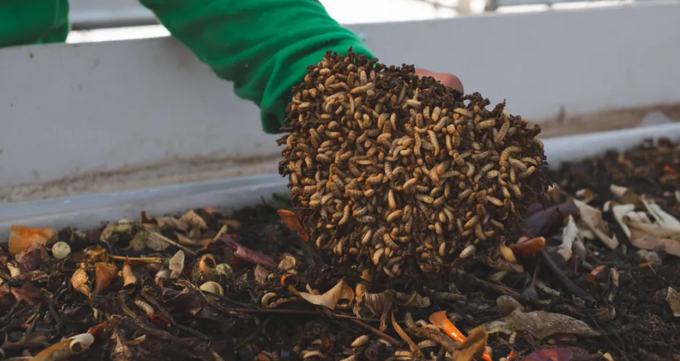May 20, 2025 | 09:22 GMT +7
May 20, 2025 | 09:22 GMT +7
Hotline: 0913.378.918
May 20, 2025 | 09:22 GMT +7
Hotline: 0913.378.918

Despite its benefits, though, frass isn’t widely used yet.
While they might not win any beauty contests, the black soldier fly larvae (BSFL) are making a massive impact by turning food waste into a nutrient-rich biofertilizer known as frass. No, I’m not joking. Bug poop might just save the world, in a manner of speaking.
Roughly one-third of the planet’s soil is degraded. That means traditional farming methods are straining under the weight of chemical fertilizers to compensate for this degradation. As such, scientists have been on the hunt for new eco-friendly solutions that won’t worsen our fight against climate change.
Enter BSFL. These tiny bugs can consume almost any type of organic waste, from food scraps to agricultural byproducts. But they don’t just nibble. Researchers say they devour waste, munching through up to four times their body weight in waste every single day.
In comparison, traditional composting often takes up to 10 months or longer to recycle the same amount of waste. That’s a pretty big difference. And, combined with other advancements in soil—like the smart soil that can grow crops with less water—frass could be a good opportunity to improve how farmers work their fields.
But the real magic happens after the black soldier fly larvae have had their feast. That’s because the larvae leave behind something scientists call frass. This nutrient-packed byproduct acts as a natural fertilizer and is brimming with the components plants love and need to survive—like nitrogen, phosphorus, and other beneficial microbes.
And, unlike synthetic fertilizers that degrade soil health over time, frass boosts soil biodiversity and can even improve water retention. Further, because of the various microbes it is packed with, researchers say it could even help crops build natural resistance to pests and diseases.
The US Department of Agriculture (USDA) has wasted no time in calling on these tiny little waste eaters, either. The agency recently awarded grants to several companies that are pursuing new frontiers in BSFL farming. The model here is relatively simple, too. Local farms supply food waste to feed the larvae; in return, they get frass to enrich their soil.
Despite its benefits, though, frass isn’t widely used yet. Regulatory hurdles remain, and the US National Organic Program isn’t willing to fully embrace insect-based fertilizers. Plus, there’s the whole thing with public perception—convincing people that bug poop is the next big thing in farming isn’t exactly an easy sell despite traditional fertilizers utilizing animal poop for thousands of years.
But, as fertilizer costs continue to soar and climate concerns grow, BSFL could offer a low-cost, eco-friendly alternative. Reports say farmers who have tested frass on their crops have reported faster growth, healthier plants, and improved soil. All that’s left to do now is topple the market that big fertilizer has spent decades building.
BGR

(VAN) Vietnam aims to become a 'leader' in the region in the capacity and managing effectively soil health and crop nutrition.
![Reducing emissions from rice fields: [Part 1] Farming clean rice together](https://t.ex-cdn.com/nongnghiepmoitruong.vn/608w/files/news/2025/05/05/z6509661417740_a647202949c539012a959e841c03e1d3-nongnghiep-143611.jpg)
(VAN) Growing clean rice helps reduce environmental pollution while increasing income, allowing farmers to feel secure in production and remain committed to their fields for the long term.
/2025/05/19/5136-1-144800_230.jpg)
(VAN) The Nghe An Provincial People's Committee has just approved the list of beneficiaries eligible for revenue from the Emission Reductions Payment Agreement (ERPA) in the North Central region for the year 2025.

(VAN) 14 out of 35 domesticated elephants in Dak Lak province have had their living conditions improved, with 11 of them currently participating in the non-riding elephant tourism model.

(VAN) Muong Nhe Nature Reserve hopes that being upgraded to a national park will lay the foundation for forest protection efforts to be carried out in a systematic, modern, and sustainable manner.
/2025/05/16/3923-2-171845_52.jpg)
(VAN) Lower costs, higher yields, and improved soil quality are outstanding benefits that soybeans bring when integrated into the crop rotation system.

(VAN) The 'For a Green National Environment' programme aims to promote a green lifestyle, support businesses in implementing ESG practices, and turn Net Zero commitments into concrete actions.